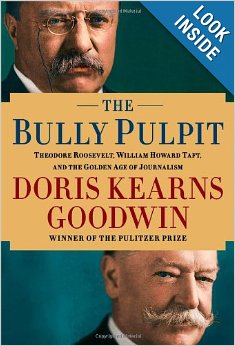 The gap between rich and poor has never been wider . . . legislative stalemate paralyzes the country . . . corporations resist federal regulations . . . spectacular mergers produce giant companies . . . the influence of money in politics deepens . . . bombs explode in crowded streets . . . small wars proliferate far from our shores . . . a dizzying array of inventions speeds the pace of daily life.
The gap between rich and poor has never been wider . . . legislative stalemate paralyzes the country . . . corporations resist federal regulations . . . spectacular mergers produce giant companies . . . the influence of money in politics deepens . . . bombs explode in crowded streets . . . small wars proliferate far from our shores . . . a dizzying array of inventions speeds the pace of daily life.
These unnervingly familiar headlines serve as the backdrop for Doris Kearns Goodwin’s highly anticipated The Bully Pulpit: Theodore Roosevelt, William Howard Taft, and the Golden Age of Journalism — a dynamic history of the first decade of the Progressive era, that tumultuous time when the nation was coming unseamed and reform was in the air.
The story is told through the intense friendship of Theodore Roosevelt and William Howard Taft—a close relationship that strengthens both men before it ruptures in 1912, when they engage in a brutal fight for the presidential nomination that divides their wives, their children, and their closest friends, while crippling the progressive wing of the Republican Party, causing Democrat Woodrow Wilson to be elected, and changing the country’s history.
The Bully Pulpit is also the story of the muckraking press, which arouses the spirit of reform that helps Roosevelt push the government to shed its laissez-faire attitude toward robber barons, corrupt politicians, and corporate exploiters of our natural resources. The muckrakers are portrayed through the greatest group of journalists ever assembled at one magazine—Ida Tarbell, Ray Stannard Baker, Lincoln Steffens, and William Allen White—teamed under the mercurial genius of publisher S. S. McClure.
Goodwin’s narrative is founded upon a wealth of primary materials. The correspondence of more than four hundred letters between Roosevelt and Taft begins in their early thirties and ends only months before Roosevelt’s death. Edith Roosevelt and Nellie Taft kept diaries. The muckrakers wrote hundreds of letters to one another, kept journals, and wrote their memoirs. The letters of Captain Archie Butt, who served as a personal aide to both Roosevelt and Taft, provide an intimate view of both men.
The Bully Pulpit: Theodore Roosevelt, William Howard Taft, and the Golden Age of Journalism, like Goodwin’s brilliant chronicles of the Civil War and World War II, exquisitely demonstrates her distinctive ability to combine scholarly rigor with accessibility. It is a major work of history—an examination of leadership in a rare moment of activism and reform that brought the country closer to its founding ideals.
Review
“If you find the grubby spectacle of today’s Washington cause for shame and despair—and really, how could you not?—then I suggest you turn off the TV and board Doris Kearns Goodwin’s latest time machine. … [Goodwin puts] political intrigues and moral dilemmas and daily lives into rich and elegant language. Imagine ‘The West Wing’ scripted by Henry James.”
(Bill Keller, The New York Times Book Review)
“Doris Kearns Goodwin tells this tale with her usual literary skill and deep research. … Goodwin not only sheds light on the birth of the modern political world but chronicles a remarkable friendship between two remarkable men.”
(The Wall Street Journal)
 Biography
Biography
Doris Kearns Goodwin won the Pulitzer Prize in history for No Ordinary Time, which was a bestseller in hardcover and trade paper. She is also the author of Wait Till Next Year, The Fitzgeralds and the Kennedys, and Lyndon Johnson and the American Dream. She lives in Concord, Massachusetts, with her husband, Richard Goodwin.
PURCHASE The Bully Pulpit: Theodore Roosevelt, William Howard Taft, and the Golden Age of Journalism on Amazon.com >>>
ATTENTION READERS
We See The World From All Sides and Want YOU To Be Fully InformedIn fact, intentional disinformation is a disgraceful scourge in media today. So to assuage any possible errant incorrect information posted herein, we strongly encourage you to seek corroboration from other non-VT sources before forming an educated opinion.
About VT - Policies & Disclosures - Comment Policy



